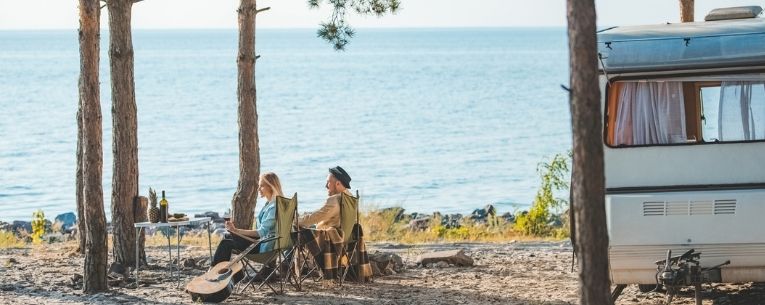As the workplace becomes more of a state of mind than a brick-and-mortar building, many are considering trading their work-from-home routine for an open road lifestyle. With approximately one million Americans opting for full-time RV travel, living and working on the go isn’t just a possibility, it’s becoming the reality.1
Can You Actually Work Remotely?
If your current job already allows you to work from home, it’s still a good idea to make sure your company is A-OK with idea of you routinely working hundreds of miles away. You certainly don’t want to make the move only to find out that it’s going to cost you your job. Alternatively, there are companies that operate entirely remotely and have a “work from anywhere” mentality as part of their company culture. If RV travel is quickly climbing your list of priorities, landing a job at one of these companies or even being an entrepreneur on wheels could be a game changer for you.
Staying Connected
Okay, so you have permission, but let’s talk feasibility. Most remote positions require access to cell service and Wi-Fi, which is not necessarily a guarantee wherever you go. Multiple full-time RV travelers recommend having backup plans on top of backup plans if your livelihood depends on internet access. For many, the first line of defense is a hotspot. You can help improve your chances of getting a reliable connection via hotspot by investing in phone plans through multiple carriers.2 Know that while some RV campgrounds advertise Wi-Fi as an amenity, speeds aren’t always comparable, and sometimes require a signal booster. Fortunately, RVers’ campground reviews on sites including campendium.com can give you an idea of whether a particular campground’s Wi-Fi is what it promises to be.2 If you still can’t get service, and need to meet a deadline, you can also seek out public Wi-Fi at coffee shops and public libraries, but you’ll be at the mercy of their operating hours.
Choosing A Vessel for RV Travel
Before you purchase a car, you do research to see what makes the most sense for your lifestyle. The same should apply before you invest in your home-on-wheels. Size and functionality vary widely. Some vans and campers are just a step above camping, primarily meant to offer a place to sleep.3 On the other end of the spectrum are completely outfitted set-ups with plumbing, a kitchen, and a higher price tag. There are sites such as RVshare.com that allow you to rent an RV or camper. More than one person has thought they could easily transition to life on the road, only to cut their trip short in favor of resuming life in one spot.4 Renting and taking a test drive can help you get your feet wet before you sell all your belongings, break your lease, and embark on a year-long journey.
Life on the Road Isn’t Free.
When you consider full-time RV travel, you probably jump straight to all the money you’ll save by not having a mortgage, rent, or utilities. But before you assume that life on the road will immediately translate into a cash windfall, crunch the numbers. On top of the basic expenses such as food, traveling by RV requires a new set of expenses, including: buying or leasing your RV, buying or leasing an additional car to tow (for outings that can’t accommodate your RV), insurance for both vehicles, fuel for both vehicles, overnight fees at certain campgrounds, and maintenance and repair fees as needed to name a few.5 With careful budgeting, there are ways to save, including opting for free campgrounds when possible, but it’s a bit of a myth that life on the road is automatically cheaper.6
Take a Look in the Mirror Before Committing
Are you the type of person who gets cranky when they hit a little bit of traffic? Have you been known to melt down over a flat tire or mechanical issue? Traveling 24/7 may sound great in theory, but it’s not for everybody. When you’re driving around a big hunk of metal day after day, all sorts of things break, squeak, and wiggle out of place. A well-rounded toolbox and an ability to follow along with a DIY video can go a long way towards getting back on the road quickly. But, if you’re not at all handy, you’ll need to hire someone who is.5 And many RV repairs can sideline vehicles for weeks or longer; where will you hang out? At the very least, the ability to go with the flow when plans inevitably go awry is essential for RV travel.
On the other hand, having the great outdoors as your office could be a dream come true. Being on a road trip vacation every day may never get old. And untethering from conventional living could have you asking, “Why didn’t I do this sooner?!”
If you’re ready to dive into RV travel, even just part time, you probably don’t want to think about travel insurance every time you fire up the engine. Rather than securing travel insurance multiple times per year, the Allianz Global Assistance AllTrips Basic Plan covers adventures you take throughout a one-year period. Having travel insurance secured for the year can help recoup prepaid, nonrefundable expenses such as campground fees and park admissions in the event of a covered loss. And 24/7 Concierge assistance can help you dial in the location of a Wi-Fi oasis or a trustworthy mechanic. Just be sure to check with us about the parameters of your travel because the duration of your trip can impact your coverage.
Happy trails, road warrior!
Related Articles








Share this Page